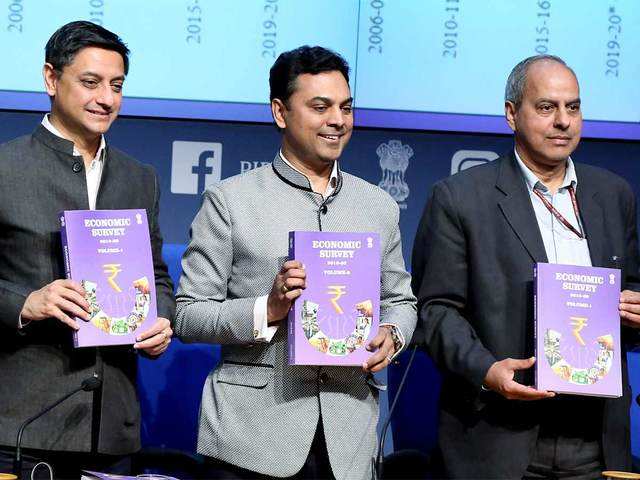Eco Survey flags 'disproportionate dwarfism' of Indian banks, calls upon PSBs to become efficient
Flagging 'disproportionate dwarfism' of banks, Economic Survey called upon PSBs to become efficient.
by PTI
New Delhi: Flagging "disproportionate dwarfism" of Indian banks as compared to the size of the economy, the Economic Survey on Friday called upon public sector banks to become efficient and support economic growth rather than "pullback lending", for India to achieve the goal of becoming a USD 5 trillion economy. The Economic Survey 2019-20 tabled in Parliament by Finance Minister Nirmala Sitharaman noted that despite nationalisation a significant portion of the poor remained unbanked till 2014.
The survey also cautioned that "inefficient PSBs can severely handicap the country's ability to exploit the unique opportunities" it can utilise today.
It suggested use of FinTech (financial technology) across all banking functions and employee stock ownership across all levels to enhance efficiencies in public sector banks, observing that with the cleaning up of the banking system and the necessary legal framework such as the Insolvency and Bankruptcy Code, the banking system must focus on scaling up efficiently to support the economy.
The survey said bank employees should be given stakes through an employee stock ownership plan (ESOP) together with proportionate representation on boards proportionate to the blocks held by employees to incentivise them and align their interests with those of all shareholders.
It also recommended that a GSTN type of entity should be set up to enable the use of big data, artificial intelligence and machine learning in credit decisions, especially those pertaining to large borrowers.
The survey also called on PSBN (PSB Network) to use technology to screen and monitor borrowers comprehensively and at length.
"As government is the owner of all the PSBs, government has the right to use the data that PSBs generate during their business. Therefore, the government as the promoter must set up this entity that will aggregate data from all PSBs to enable decision making using big data techniques," said the survey.
Apart from utilising data from all PSBs, which would provide a significant information advantage, PSBN would utilise other government sources and service providers to develop AI-ML ratings models for corporate.
The high operating costs of each PSB would decrease by helping them automate the end-to-end process of lending. PSBs would be able to make quicker decisions, process loan applications faster, and reduce turn-around-times, said the survey.
The survey also said that if Indian banks were proportionately large in relation to the size of the Indian economy, India should have at least six banks in the global top 100 than just the current largest PSB State Bank of India, which is the 55th largest bank globally.
Pointing out that in 2019, India completed the 50th anniversary of the bank nationalisation programme undertaken in 1969, the survey made a special mention of the accomplishments of the 389,956 officers, 295,380 clerks, and 121,647 sub-staff who work in public sector banks and said the time was apt to celebrate them.
Observing that both rural bank deposit mobilisation and rural credit increased significantly after the 1969 nationalization, the survey however, said some caution is necessary in interpreting the above trends as being entirely caused by nationalisation.
Quoting studies, it said the differential impact on poverty seen during 1977-1991 cannot be attributed to nationalisation.
Besides the non performing assets (NPAs) leading to losses, frauds are another source of concern in PSBs, said the survey, highlighting the urgent need for a thriving banking sector and a vibrant banking system which can support and unleash a multiplier effect and permanently alter India's growth trajectory in a positive way.
"A large economy needs an efficient banking sector to support its growth. As PSBs account for 70 per cent of the market share in Indian banking, the onus of supporting the Indian economy and fostering its economic development falls on them. Yet, on every performance parameter, public sector banks (PSBs) are inefficient compared to their peer groups," said the survey.
The survey highlights that there is a "disproportionate dwarfism of the Indian banks when compared to the size of the Indian economy. A fit of the number of banks in the global top 100 and the size of the economy shows clearly that India is a significant outlier on the negative side. All the largest economies have proportionately large banks."
It noted that majority ownership of the government and its writ on bank functioning also results in an implicit promise of the bailout of bank liabilities which is an implicit cost to the taxpayer.
"The majority ownership by the government also subjects PSB officers to scrutiny of their decisions by the central vigilance commission and the comptroller auditor general. With no real restrictions on what can be investigated and under what circumstances, officers of state-run banks are wary of taking risks in lending or in renegotiating bad debt, due to fears of harassment under the veil of vigilance investigations," the survey said.